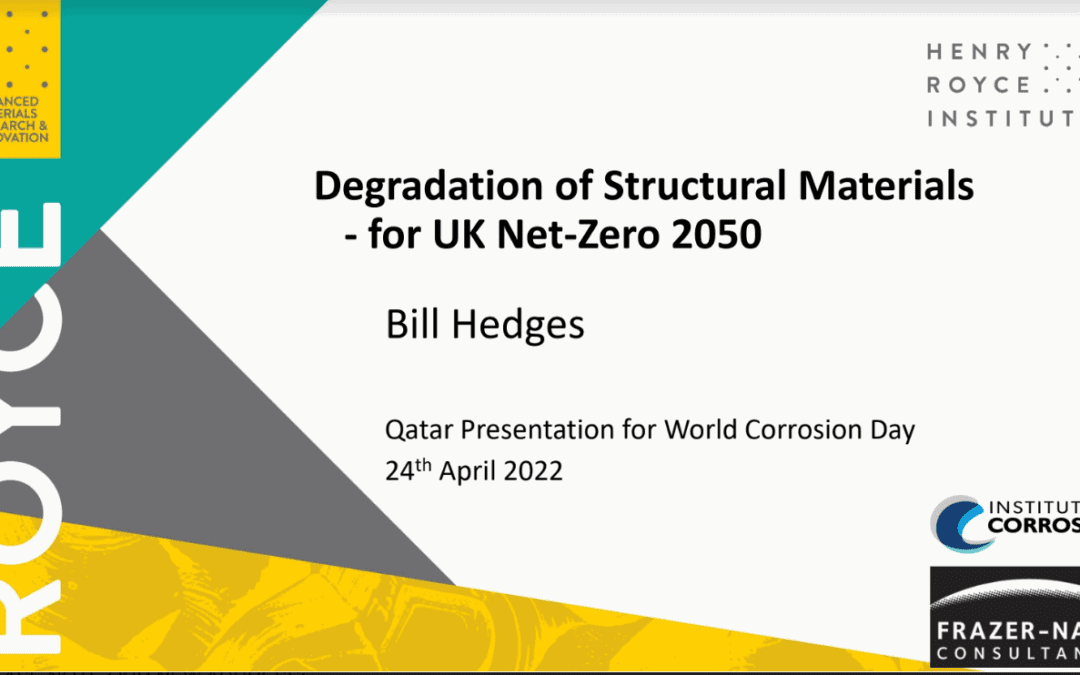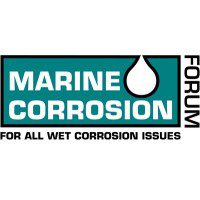
Conferences and Events, Industry News, Latest News
Marine Corrosion Forum
Meeting 6 July 2022
National Motorcycle Museum, Birmingham, B92 0EJ
Revised program
Access Live Stream via MCF web site ‘Attend’ page
https://marinecorrosionforum.co.uk/attend
1030 Registration and Coffee/Tea
1100 Using the new Standard EN ISO 24656 ‘Cathodic Protection for Offshore Wind Structures’. Birit Buhr, Oersted
1145 Offshore Renewables Cathodic Protection, Impacts of revised DNV Requirements. Lars Lichtenstein, DNV
1230 Combined discussion on Offshore Renewables
1245 Buffet Lunch
1300 MCF News and Open Forum
1315 SCC of Austenitic Cast Iron in Seawater. Roger Francis, RF Materials
1415 Localised Corrosion of Wire Arc Additively Manufactured (WAAM) Duplex Stainless Steel. Hussam Attar, Manchester University
1530 Tea/Coffee
The Marine Corrosion Forum is recognised by the Institute of Corrosion and the Institute of Marine Engineering, Science and Technology as offering technical presentations which will contribute to an individual member’s Professional Development requirements. Each agenda is also submitted for approval to the Institute of Materials, Mineral & Mining (IoM3)
The MCF reserves the right to amend the program at any time as circumstances dictate
Marine Corrosion Forum Birmingham 060722 Revised Program 040722
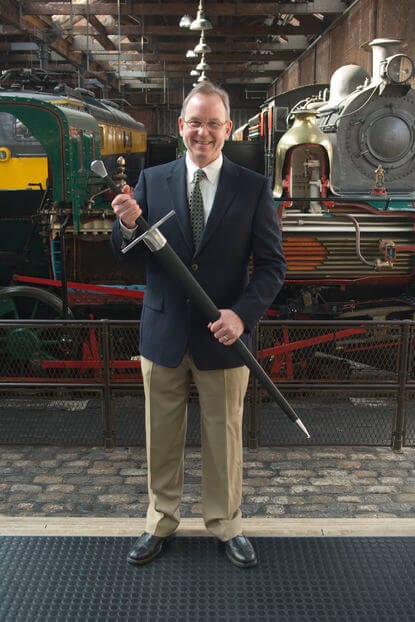
Blogs, Conferences and Events
Recognising Past, Present and Future Talent
Each year, the Institute of Corrosion presents several internationally recognised Outstanding Achievement awards in corrosion science. These are presented to individuals to recognise their contribution to furthering knowledge, learning and research in this specialised field. The awards range from cash to a sword of which King Arthur would have been proud.
Here’s a summary of the prestigious awards that are coordinated by the Corrosion Science Division, and presented to past, present, and potential pioneers in corrosion science.
Lionel Shreir Award
Presented at the Corrosion Science Symposium, the Lionel Shreir Award is presented to the student judged to have given the best presentation at the symposium. A sub-committee of the Corrosion Science Division selects the recipient from all those who present at the event. This year, the symposium will be an online event for the first time, which brings in a whole new dimension to presenting skills. The criteria for selection for the award are:
- Originality and creativity of research
- Knowledge of corrosion science and practice
- Clarity of presentation and rapport with audience
- Clarity when answering questions
Submissions of 200-word abstracts detailing a 10-minute talk that students would like to give are being accepted from students around the world. These abstracts will be reviewed, and those selected will be contacted and asked to provide an extended abstract by Friday 28th August 2020.
For the opportunity to be awarded the highly sought-after certificate and cash prize, send your abstract to j.a.wharton@soton.ac.uk by Friday 17th July 2020.
Galloway Award
We have begun to receive nominations from overseas already for this award, which consists of a certificate and a cash sum.
The Galloway Award is presented to the student author of what the judging committee decide is the best published paper that describes original research in corrosion science and engineering during the last year.
In addition to the certificate and cash sum, a summary of the winner’s paper will be published in the Corrosion Magazine. (Don’t worry, if you’re the winner, you retain copyright of your work – allowing you to publish in other scientific journals.) The international reach of this magazine gives the student even more exposure to the global corrosion community.
Submissions of papers that have either been published in the last 12 months or are in draft form should be sent to the Corrosion Science Division Chair Julian Wharton, by email to j.a.wharton@soton.ac.uk.
T.P. Hoar Award
This award is reserved for those authors who have papers published in Corrosion Science and recognises the best paper from the previous year. A sub-committee of the Corrosion Science Division selects the winning paper, which is announced by the end of the year. The winning authors receive a certificate and a cash sum.
U.R. Evans Award
The U.R. Evans Award is the premier award of the Institute of Corrosion. An annual award, it is presented by the President of ICorr to an eminent researcher, corrosion scientist, academic, or industrialist. The recipient is selected by a Corrosion Science Division panel, and invited to give the plenary talk at the Corrosion Science Symposium. (The picture at the head of this article is Dr. Peter Andresen with the U.R. Evans award that was presented to him in 2014.)
It is usually at this event that the recipient is presented with their award and they are also granted Honorary Life Fellowship of the Institute. The award itself is a broadsword, and one that takes an edge – which has proved somewhat problematic in previous years.
Dr Julian Wharton recalls some trials and tribulations a previous winner of the award had in getting the sword home. “The sword had to go down to New Zealand in 2015, and the recipient had to try to get the ceremonial sword through customs. The winner, Professor David Williams, had real difficulties.
“Then you take it to university, and they say, ‘You want to hang a sword in your office?’ ”
The sword’s design has been modified slightly over time, and is no longer made from stainless steel. While a proper sword, if kept in non-ideal conditions they can corrode slightly. “But clearly, the recipient should be able to deal with any corrosion, given their background,” says Dr Wharton.
Robert Cottis – this year’s winner of the U.R. Evans Award
Professor Robert Cottis was appointed Professor Emeritus in Corrosion Science and Engineering on his retirement in 2011 after an exceptional career in the field of corrosion science. Here’s a potted history of his life in corrosion science:
- Graduated in Natural Science, specialising in Metallurgy in 1967
- Awarded a PhD in 1973 for work on electrodeposition in the fluidized electrode at the Department of Metallurgy and Materials Science at Cambridge
- Appointed as a Project Manager, then Research Manager at the Fulmer Research Institute
- Worked on long-term research in the general area of corrosion, especially on corrosion fatigue
- Undertook many short-term failure investigations and other consultancy work
- Joined the Corrosion and Protection Centre, UMIST in 1979, initially as a lecturer, then senior lecturer, reader, and professor
Active in the development of teaching in the field of corrosion, Professor Cottis was responsible for the development of a distance learning approach to the MSc in Corrosion Control Engineering.
He was the Director of the TLTP Consortium – which developed the Ecorr courseware to support corrosion teaching – and the founding editor of the open-access online Journal of Corrosion Science and Engineering.
In 2005 he was awarded the T.J. Hull Award of NACE International for services to NACE in the field of publications, and he is a NACE Fellow.
With the experience he has, you can expect the talk by Professor Cottis to light up this year’s Corrosion Science Symposium. To find out more, email Dr Julian Wharton at j.a.wharton@soton.ac.uk.
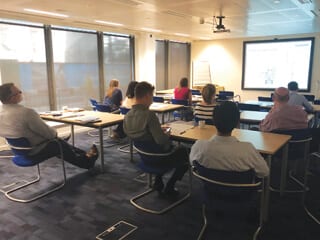
Blogs, Conferences and Events, Corrosion Engineering Division, Latest News, YEP
Could you solve this case study and become a big winner?
The young engineers in the Institute of Corrosion’s Young Engineer Programme are an innovative bunch. There was no way that the coronavirus lockdown and curtailing of mass gatherings was going to stop them in their tracks.
Instead of in the elegant Royal Over-Seas League club in London, these intrepid young engineers gathered around their computer screens at home to learn of the 2020 Case Study that will be used to determine which group of young engineers will be the winners of this year’s star prize. It was the first time that an ICorr Young Engineers group had met online, but was so successful that it is unlikely to be the last.
2018’s Winning Young Engineers group whet appetites for success
With an appraisal of their winning case study from 2018, Caroline Allanach, Danny Burkle and Tim Evans whet the appetites for success of the young engineers in attendance online during the evening.
The insight they provided as to how they approached their task, and a critical assessment of their reaction and solution to the failure that occurred was both informative and entertaining. So, too, was their description of the prize they won – a tremendous trip to the 2019 NACE Conference in Nashville.
A corrosion conundrum is this year’s case study
There are seven participating groups in this year’s Young Engineer Programme case study, and they have been given quite a conundrum to unravel.
The case study was presented by Steve Paterson, from Arbeadie Consultants Ltd., who has a career of corrosion experience to draw on. He hasn’t made it easy for this year’s programme participants. Here is the scenario he has set:
- Several leaks have been identified in the titanium piping in an onshore desalination plant
- This plant is used to remove salts from mono-ethylene glycol
- The plant is also used for hydration and corrosion control in gas pipelines from three offshore fields
At the end of the presentation, the 32 young engineers were posed with the problems they must work to overcome, which include:
- How to perform a corrosion risk assessment to determine that the plant is safe to operate
- Recommending alternative materials to use
- Identifying what mitigation options could be used to prolong the life of this section of the desalination plant
- Identifying the root cause of the corrosion
Online meetings can get lively!
The young engineers in this year’s intake come from 19 companies, and their specialities include mechanical and materials engineering, welding, materials, and more. With such diversity, you might expect a lively meeting when in a meeting room. It was hard to know what to expect online, though.
The discussions that followed the presentation of the case study proved that no matter how we get together, when there’s an interesting and provocative scenario put forward, online events can be just as lively as in-person meetings.
The range of experience and specialties were certainly put to the test, and the question and answer session proved to be the first opportunity for ideas and complexities to be explored.
In brief, a fruitful, useful and exciting meeting, aptly brought to a close by Trevor Osborne, a past President of the Institute of Corrosion, and Managing Director of Deepwater Corrosion services (UK) Ltd.
The big wait begins!
And so, the big wait begins. It will be several months before we learn which group of young engineers will be this year’s winner.
The groups now undertake further investigation, collaborating behind the scenes and aided by four more lectures, and the help of a mentor assigned to each group, before presenting their case studies in November.
Could you be a future winner in the Young Engineer Programme?
Watch this space! The Young Engineer Programme is held biannually. To learn how you could become a winner, visit our YEP pages or email the Institute of Corrosion at admin@icorr.org.
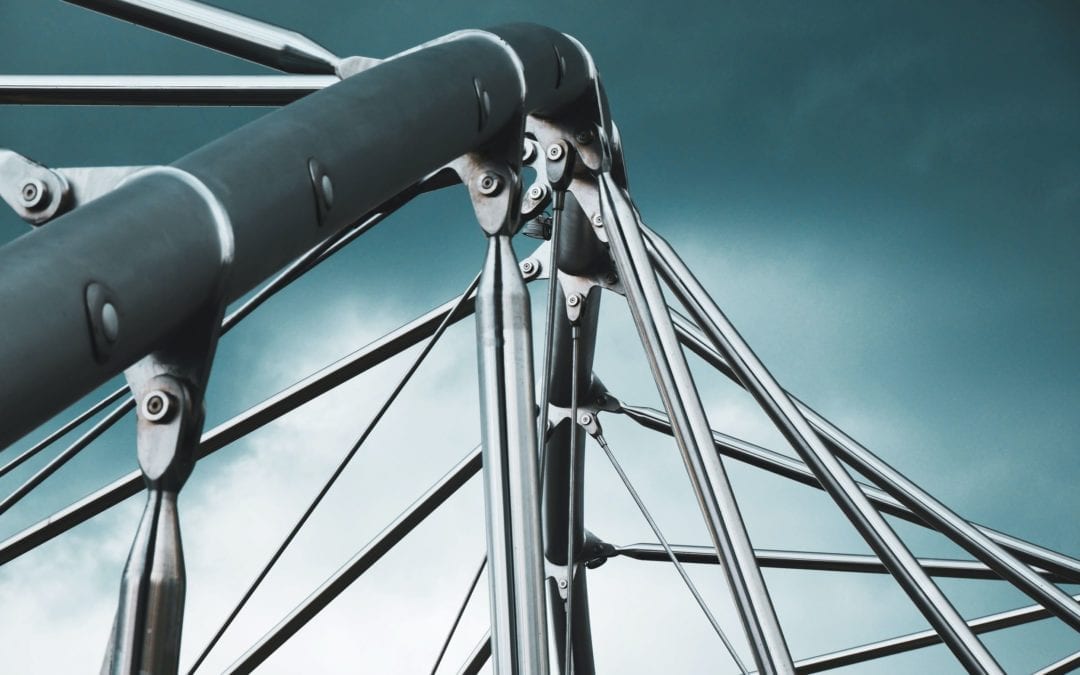
Blogs, Conferences and Events, Corrosion Science Division
Corrosion Science Symposium – The Same Prestige in a New Format for 2020
Could your abstract win the Lionel Shreir Award?
The Corrosion Science Symposium is one of the premier events in the Institute of Corrosion’s calendar. This year, circumstances looked like causing it to be cancelled. However, we’ve discovered that coronavirus, lockdown and social distancing are no match for innovative minds, willpower, and technology.
It’s not going to be quite the same as in previous years. But we think you’ll like what we’ve done to ensure the Corrosion Science Symposium is as equally engaging and enlightening an event as it has always been, since it was first held in 1959. The key to its success, as ever, is those who attend: you.
What is the Corrosion Science Symposium?
The Corrosion Science Symposium (CSS) has traditionally been a two-day event held in a prestigious location befitting of its status. The 60th CSS was held as part of Electrochem 2019, hosted by the University of Strathclyde’s Innovation Centre in Glasgow.
This is an informal meeting of the Corrosion Science Division in which corrosion scientists, corrosion engineers and PhD students can gather, receive talks on corrosion, and discuss relevant corrosion issues.
Though it is an informal event, the CSS does include certain formalities. Presentations of some of the Institute of Corrosion Awards are made during the CSS including:
- The UR Evans Award – the premier scientific award of ICorr
- The Lionel Shreir Award – for the outstanding student talk given during the CSS
A new format for new normal times
With a more unpredictable future than at any time in our history, the CSS has been moved from a physical space to cyberspace this year. While the exact format is still being finalised, we’ve set the date and the outline format.
We’re going online, but, rather than what we believe would be an intense two days of sitting in front of a screen, we’re extending to three or four sessions during the week beginning 14th September 2020.
Nearer the date, we’ll announce the exact format, times, and technology we’ll be using. One thing is for certain, though – being online, the CSS will be more accessible this year than it has ever been. Consequently, we are expecting many more international students to take part, and that could lead to some exciting competition for the Lionel Shreir Award.
What is the Lionel Shreir Award?
Lionel Louis Shreir set incredibly high standards during a career spanning engineering, research and education. A recipient of the UR Evans Award in 1978, he is, perhaps, best remembered for his encouragement and mentorship of young authors attempting to write papers.
It is fitting, therefore, that the Lionel Shreir Award is presented to the student who gives the best presentation at the CSS, with criteria for the award being:
- The originality and creativity of research
- Knowledge of corrosion science and practice
- Clarity of presentation and rapport with audience
- Clarity when answering questions
Get involved with the 61st CSS
Last year, presentations at the CSS included:
- David Kumar (University of Bristol), who gave an interesting overview of his work on hot water corrosion issues related to fusion reactor cooling circuits
- Mariana Folena (University of Leeds) reported on her studies into the role of acetic acid in CO2 top of line corrosion using real-time corrosion measurements
- Jessica Moulton (University of Manchester) gave a good overview into her recent studies modelling the behaviour of aluminium flakes in marine coatings using agar gels
- Amelia Langley (University of Bath) – the eventual winner of the Lionel Shreir Award for her talk entitled ‘Chaotic copper corrosion: the influence of dissolved gas on the anodic passivation of copper in model seawater’
We are now accepting submissions of abstracts for this year’s CSS. All you need to do is to send a 200-word abstract of a 10-minute presentation/talk you’d like to give. We’ll review the abstracts, and select those that we believe can be coordinated into a cohesive programme of presentations through the week.
The winner of the Lionel Shreir Award is selected during the CSS, and we currently plan to present the award online on the final evening – though we must still figure out the logistics of doing so!
To enter your abstract, please send to j.a.wharton@soton.ac.uk by Friday 17th July 2020. Those selected will then be contacted and asked to send an extended abstract by Friday 28th August.

Blogs, Conferences and Events, Corrosion Engineering Division
Marine Corrosion Forum and ICorr Aberdeen Branch bring expertise to your laptop
The world is in the grip of the COVID-19 pandemic. Many countries are in lockdown, and economies are on hold. But some things won’t let the coronavirus get in their way. Corrosion has a catastrophic effect on infrastructure and transport if it is ignored – just one reason why World Corrosion Awareness Day is so important.
Here at the Institute of Corrosion, we are also refusing to stand still. We understand that training and development is key to your personal success – especially during the coronavirus lockdown. The training and development initiatives that we have in place with our partners to help you with your CPD include many online options.
In this post, you’ll learn about another – a whole business week of hour-long webinars that are virtual and free, hosted by Phil Dent (Chair of the Marine Corrosion Forum) and Stephen Tate (Institute of Corrosion Aberdeen Branch).
Why a week of corrosion webinars?
The lockdown has disrupted almost all the training and events in the corrosion industry. Training providers and events organisers have had to cancel public events, and if these don’t take place then the industry is left with a void in the learning and sharing of information and innovation.
These webinars replace what would have been a full day event held in Aberdeen on 29th April.
When is the week of corrosion webinars?
The webinars will take place between April 27th and May 1st inclusive, with each webinar lasting an hour and starting at noon. Each is presented by an expert in their field. The time of the webinars has been selected to allow as many people to participate as possible.
How can I participate in the webinars?
Each webinar will follow the same format, and will be hosted on GoToMeeting:
- A one-hour subject presentation
- Q&A session via the chat box at the end of the presentation
How do I register for the webinars?
Registration couldn’t be easier. All you need do is head to the webinar registration page on the Marine Corrosion Forum website and register for the link to each webinar that you wish to attend.
When you register, you’ll be given the URL for attendance and an access code immediately, and your registration details will be sent via email.
What are the presentations?
The five webinars cover a range of key corrosion themes. Registering for them individually allows you to participate in those that are most relevant to you – or all five, of course. The webinars are:
- The Six Core Elements of Asset Management – April 27th
- Corrosion Under Insulation Online Monitoring with Electro-Magnetic Guided Radar (EMGR) – April 28th
- Hot Topic: Cold Bonding, Using Epoxy Adhesives in Place of Hot Metal Welding – April 29th
- An Overview of the Corrosion of Metals in Seawater (And What to Look for) – April 30th
- Exploring High Pressure CO2 Annular Corrosion in Flexible Pipes – May 1st
Tell me more about the webinars
Here’s a little insight about each of the webinars.
The Six Core Elements of Asset Management
27th April 2020, 12pm
Register for this webinar here
Presented by Adam Lea-Bischinger CEng CMgr MEng CMRP Eur. Ing of the Institute of Asset Management (IAM), this presentation examines the critical work of the IAM and the development and rollout of ISO 55000 which defines terminology, requirements, and guidance for implementing, maintaining and improving an effective asset management system. The presentation includes examples of UK companies operating the ISO 55000 system.
Corrosion Under Insulation Online Monitoring with Electro-Magnetic Guided Radar (EMGR)
28th April 2020, 12pm
Register for this webinar here
Presented by Dr Prafull Sharma, an inventor and Chief Technology Officer of CorrosionRADAR Ltd., you’ll learn why corrosion under insulation (CUI) continues to be a big challenge for the asset integrity management of industrial facilities, and about the growing trend to remotely monitor corrosion in accessible locations using wireless connectivity and battery-powered devices. You’ll also learn about the latest innovative sensor system for monitoring CUI that has been developed by CorrosionRADAR.
Hot Topic: Cold Bonding, Using Epoxy Adhesives in Place of Hot Metal Welding
29th April 2020, 12pm
Register for this webinar here
Presented by Henry Smith, UK Technical Supervisor of Belzona Polymerics Ltd, this webinar examines the options available to the offshore fabric maintenance engineer when it is not possible or preferable to weld, and discusses viable solutions using bonding or cold-welding technologies. You will benefit from references to case histories, from initial design to installation and ongoing inspection.
An Overview of the Corrosion of Metals in Seawater (And What to Look for)
30th April 2020, 12pm
Register for this webinar here
Presented by Carol Powell BSc, a Fellow of the Institute of Materials, Minerals and Mining, and independent consultant, this webinar provides a brief overview of the world of metals and their response to one of the most aggressive environments there is, giving examples of the types of corrosion which can occur and how to avoid them.
Exploring High Pressure CO2 Annular Corrosion in Flexible Pipes
1st May 2020, 12pm
Register for this webinar here
Presented by Maria-Eleni Mitzithra PhD and Senior Project Leader for Corrosion at TWI Ltd., this webinar focuses on the work conducted by Mitzithra and tests carried out in a lab-scale test system designed and built at TWI Ltd. for the simulation of complex annulus environments, describing corrosion rates and the link to stability, structure, and thickness of the precipitated iron carbonate scaling.
A positive response with online training and events
This week of webinars replaces the MCF meeting in Aberdeen that was due to be held on 29th April. The Institute of Corrosion has partnered with MCF to offer these webinars as an alternative, and opened them to members and non-members of ICorr and MCF. You’ll be able to gain insight into the subjects that were to be presented and discussed at the Aberdeen meeting from home, work, or other location, and it’s free of charge.
As the lockdown and COVID-19 pandemic evolves, we are proud to bring you online options like this to help you continue your personal professional growth – just one example of the benefits of membership of the Institute of Corrosion.
For details about membership of the Institute of Corrosion, visit our membership page.



